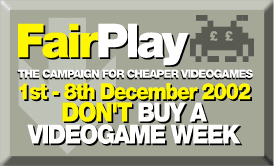|

(Press Ctrl and "Refresh" in
your browser
to ensure you've got the latest stories.)
X
X
25 October 2002- Nintendo found
guilty of artificial price-fixing
According to
The
Register, itself quoting the Wall Street Journal, the European
Commission has found Nintendo guilty of keeping the price of
videogames artificially high by illegally restricting the sales of
games from other territories where games are sold cheaper. FairPlay
is glad to see the European Commission join the ranks of our
supporters...
X
21 October 2002- Heavy losses for
Rage
The games industry's claims of economic competence took yet
another blow as
Rage, one of the few remaining UK software publishers, announced a loss of over £10 million for the financial year
ended June 2002, following losses of over £9 million the previous
year. The losses came about despite the firm managing to release 15
new games into the market compared to five in 2001, including a
David Beckham-licensed football game, which accounted for more than
a third of the company's entire turnover. The full story can be
found
here.
X
21 October 2002-
Acclaim loses millions, shares collapse
Giant US software publisher Acclaim saw its share price plunge as
it announced a loss of over $28 million for the last three
months of 2002, leaving the company with a full-year loss of over $4
million compared with 2001's $17 million profit. The company's share
price is currently standing at just 76 cents, compared with a year
high of $6.25. Full story
here.
21 October 2002-
CM 4 and Tomb Raider postponed, escape boycott
Championship Manager 4 from Sports Interactive (see below), which
was slated by most sources for a release on December 6, during the
FairPlay boycott week, has had its release put back until early
2003. The publisher of Championship Manager, Eidos, also announced
that the new Tomb Raider game, which was previously scheduled
to be released shortly before the boycott week, has also been
delayed until 2003. We are sure there is no connection between these
facts and the FairPlay campaign.
16 October 2002-
FairPlay speaks to Peter Molyneux
The FairPlay campaign has conducted an interview with Peter
Molyneux, one of the industry's most successful developers ever and
chief of Lionhead Studios. Read it here.
X
7 October 2002-
FairPlay press release #2
The industry has continued to mount smear attacks on FairPlay
rather than tackle the issues raised by the campaign. We respond to
the content of those attacks here.
4 October 2002-
FairPlay's first lawsuit departs
Following our disclosure of Sports Interactive's legal attack, it
appears the threatened lawsuit has now been withdrawn. The quote
concerned remains in place on the website.
4 October 2002-
FairPlay's first lawsuit arrives
The games industry, a bit stuck for a plausible defence of its
pricing strategies, today used an alternative approach to try to
silence the FairPlay campaign, by serving the campaign with its
first lawsuit. Sports Interactive, publishers of the highly
successful Championship Manager series - which, ironically, achieved
its success in part by selling most of the game's updates at £20,
rather than £40 - set its lawyers on the campaign over a quote on
this website suggesting that lower-priced games sell more copies.
Obviously we can't go into too much detail right now, but we'll keep
you posted on the case. We are not currently alarmed.
X
3 October 2002-
FairPlay press release #1
The campaign's response to the series of
vitriolic personal attacks launched by the games industry on October
2.
X
27
September 2002- Capcom predicts
huge losses
The latest industry giant to announce
massive losses
is Capcom, owners of the massively successful Street
Fighter and Resident Evil franchises, along with many
more. Despite these popular and big-selling titles, the company
has amended its profit forecasts for the year ending next March
from a profit of £2 million to a loss of £66 million. Once
again, even a publisher with popular and chart-topping titles is unable
to turn those sales into profit, appearing once more to
demonstrate that the games industry's current economic strategies
are hugely flawed.
X
19 September 2002 - Big software publisher's
catastrophic results
French software publisher Infogrames, one of the largest companies
in the industry and the owner of former British companies like Ocean,
recently published a disastrous set of financial figures, posting
losses of around £50 million despite a sales increase of
14%. The company now has total debts of around £250 million. The
firm's share price has collapsed by over 80% in the last year -
in an attempt to reassure investors and reduce costs, the company
is said
to be preparing to lay off around 33% of its entire European
workforce.
Bruno Bonnell, the president
of Infogrames, has expressed the opinion repeatedly that cheaper
games are necessary for the videogames industry to survive and prosper.
However, the current licensing arrangements of console manufacturers
effectively make it impossible for Infogrames to pursue this policy.
The results are obvious.
X
5 September 2002 - Eidos
losses continue
Eidos, the UK's last surviving major software publisher, announced
its results for the last 15 months. The company, despite owning the
massively successful Tomb Raider, Who Wants To Be A Millionaire,
Commandos and
Championship Manager lines of games, lost £30.7 million in
the 15-month period, which was at least an improvement on the
company's 2001 losses of £111 million. Shares in the company,
once valued at over £12 each, currently stand some 90% lower, at
120p.
Clearly, while the industry currently survives by milking its big
hits, even ownership of four of the biggest-selling hit series in
the business is no guarantee of making a profit with the current
economic model.
X


>> << <<
|


